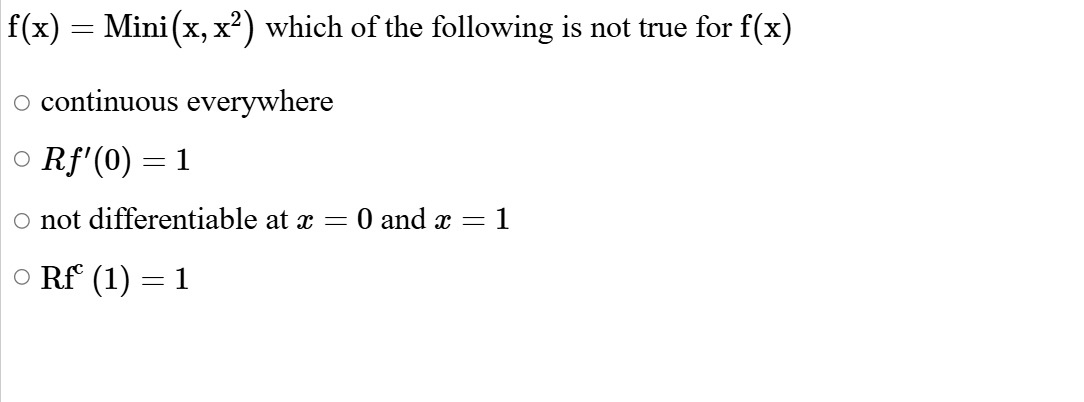Question
Question: Which of the following is not true for $f(x) = \min(x, x^2)$?...
Which of the following is not true for f(x)=min(x,x2)?

continuous everywhere
Rf′(0)=1
not differentiable at x=0 and x=1
Rf′(1)=1
Rf′(0)=1
Solution
The function is defined as f(x)=min(x,x2). We first determine the piecewise form of f(x). The equality x=x2 holds when x2−x=0, which factors as x(x−1)=0. Thus, the intersection points are x=0 and x=1.
We analyze the inequality x≤x2, which is equivalent to x2−x≥0, or x(x−1)≥0. This inequality holds for x∈(−∞,0]∪[1,∞). Therefore, f(x)=x for x≤0 or x≥1.
The inequality x>x2 holds when x2−x<0, or x(x−1)<0. This inequality holds for x∈(0,1). Therefore, f(x)=x2 for 0<x<1.
The piecewise definition of f(x) is:
f(x)=⎩⎨⎧xx2xif x≤0if 0<x<1if x≥1Now, let's evaluate each statement:
-
Continuous everywhere: We check continuity at the transition points x=0 and x=1. At x=0: limx→0−f(x)=limx→0−x=0. limx→0+f(x)=limx→0+x2=02=0. f(0)=0. Since limx→0−f(x)=limx→0+f(x)=f(0), f(x) is continuous at x=0.
At x=1: limx→1−f(x)=limx→1−x2=12=1. limx→1+f(x)=limx→1+x=1. f(1)=1. Since limx→1−f(x)=limx→1+f(x)=f(1), f(x) is continuous at x=1. Since f(x) is defined by polynomials (x or x2) in the intervals (−∞,0), (0,1), and (1,∞), it is continuous there. Thus, f(x) is continuous everywhere. This statement is true.
-
Rf′(0)=1: Rf′(0) is the right-hand derivative of f(x) at x=0. Rf′(0)=limh→0+hf(0+h)−f(0). Since f(0)=0 and for small h>0, f(h)=h2 (as h∈(0,1)), we have: Rf′(0)=limh→0+hh2−0=limh→0+hh2=limh→0+h=0. The statement claims Rf′(0)=1, which is false. This statement is not true.
-
Not differentiable at x=0 and x=1: At x=0: The left-hand derivative is Lf′(0)=limh→0−hf(0+h)−f(0). For h<0, f(h)=h. Lf′(0)=limh→0−hh−0=limh→0−1=1. Since Lf′(0)=1 and Rf′(0)=0, f(x) is not differentiable at x=0.
At x=1: The left-hand derivative is Lf′(1)=limh→0−hf(1+h)−f(1). For small h<0, 1+h∈(0,1), so f(1+h)=(1+h)2. f(1)=1. Lf′(1)=limh→0−h(1+h)2−1=limh→0−h1+2h+h2−1=limh→0−(2+h)=2. The right-hand derivative is Rf′(1)=limh→0+hf(1+h)−f(1). For small h>0, 1+h≥1, so f(1+h)=1+h. Rf′(1)=limh→0+h(1+h)−1=limh→0+hh=1. Since Lf′(1)=2 and Rf′(1)=1, f(x) is not differentiable at x=1. Therefore, f(x) is not differentiable at x=0 and x=1. This statement is true.
-
Rf′(1)=1: From our calculation in point 3, we found Rf′(1)=1. This statement is true.
The question asks which statement is not true. Only statement 2, "Rf′(0)=1", is false. The correct value for the right-hand derivative at x=0 is 0.
